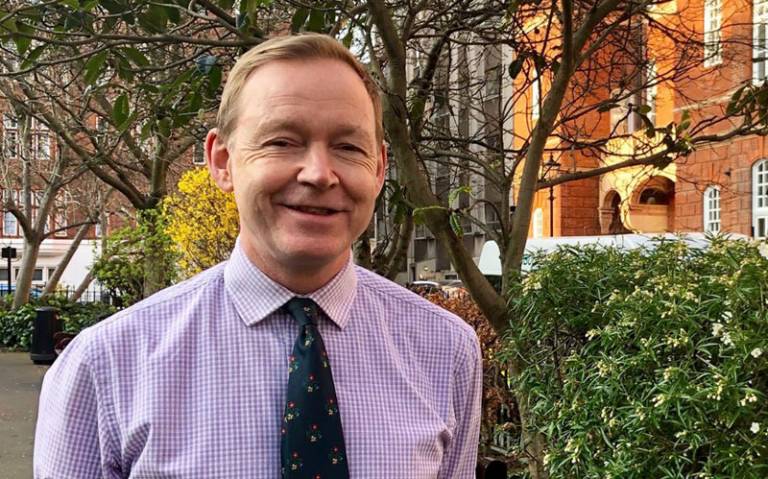Spotlight on: Nick Ward
22 October 2020
This week we talk to Nick, a Professor of Clinical Neurology and Neurorehabilitation at UCL Queen Square, about his work with recovering brain injury patients during the COVID-19 pandemic.

What is your role and what does it involve?
I am a Professor of Clinical Neurology and Neurorehabilitation at UCL Queen Square Institute of Neurology. My clinical and research interest is in understanding how to promote best recovery of movement, particularly of the arm and hand, after stroke and other forms of brain injury. I run an NHS service that offers high dose and intensity of upper limb rehabilitation. I also have a research group that focuses on various aspects of the relationship between brain injury and upper limb recovery, using brain imaging, neurophysiology and fine-grained measures of motor behaviour.
How long have you been at UCL and what was your previous role?
I started at UCL in 1999 as a research fellow at the Wellcome Trust Centre for Human Neuroimaging in Richard Frackowiak’s group, using fMRI to look at brain reorganisation after stroke. Before that, I was a junior doctor in the NHS doing my neurology training.
What working achievement or initiative are you most proud of?
Stroke and brain injury are by far the most common cause of neurological disability in the world and despite this, clinical services for recovery are under resourced and undervalued in the NHS and beyond. I set up the Queen Square Upper Limb Neurorehabilitation programme with Kate Kelly (consultant Occupational Therapist) and Fran Brander (Consultant Physiotherapist) in 2013 to create a gold-standard clinical service that could show what is possible with high dose and intensity of treatment. It started slowly, but in 2019, we published the results of the first 224 people to go through the programme showing what can be achieved through aspirational thinking. The QSUL programme is a great example of an academic-clinical service providing gold-standard treatment embedded in a research environment that will help us develop and deliver improved treatments for better outcomes for patients.
Tell us about a project you are working on now which is top of your to-do list?
A lot of the current work is understandably in response to COVID-19. We quickly realised that people with stroke and other forms of brain injury would be discharged from hospital earlier than usual as a result of the pandemic and consequently spend less time in hospital receiving neurorehabilitation. Once home, the community rehabilitation teams were unable to visit, leaving large numbers of people with recent stroke and their families feeling abandoned and socially isolated. We wanted to find a way of helping the community rehabilitation teams and so with support from Emilia Clarke's SameYou charity we created a completely new online group-based telerehabilitation programme, called Neurorehabilitation-Online (N-ROL) at Queen Square. N-ROL allows one or two clinicians to work with groups of up to 15 patients at a time, without patients having to leave their own home. We have been able to provide physical training groups as well as groups for communication, cognitive and emotional difficulties. We even had groups specifically to support the carers. We feel it has been a huge success based on the response of the patients and carers. The patient testimony is incredibly heart-warming but at the same time, we know we have only reached a small number of people who could have benefited. We need the to look at the data to support a larger programme of work to investigate new ways of delivering effective support and neurorehabilitation to more people who need it.
What is your favourite album, film and novel?
Album: Innervisions by Stevie Wonder
Film: Shoplifters by Hirokazu Kore-eda
Novel: Flights by Olga Tokarczuk
All beautiful and moving!
What is your favourite joke (pre-watershed)?
Anything on @KidsWriteJokes
Who would be your dream dinner guests?
All of the great team who have been working on N-ROL. If they are not available, maybe a one to one with Arsene Wenger.
What advice would you give your younger self?
Not sure that I’m wise enough yet to be offering life advice to young people...
What would it surprise people to know about you?
They might be surprised to learn that I think I’m a talented footballer.
What is your favourite place?
London
 Close
Close

